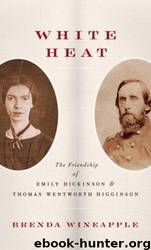White heat: the friendship of Emily Dickinson and Thomas Wentworth Higginson by Brenda Wineapple

Author:Brenda Wineapple
Language: eng
Format: mobi, epub
Tags: Correspondence, Poets, Literary Collections, American - 19th century, Emily - Correspondence, Higginson, Emily - Friends and associates, Poetry, Fiction, Literary, Thomas Wentworth, American, Literary Criticism, 19th century, Letters, Dickinson, Biography & Autobiography, American - 19th century - Correspondence, General, Biography
ISBN: 9781400044016
Publisher: Random House, Inc.
Published: 2008-12-15T00:38:53.100000+00:00
Sleeps the bravest of the brave?
Is it he who sank to rest
With his colors round his breast?
Friendship makes his tomb a shrine;
Garlands veil it; ask not mine.
As if struck by the banality of his questions, the speaker then turns in a different direction:
One low grave, yon trees beneath,
Bears no roses, wears no wreath;
Yet no heart more high and warm
Ever dared the battle-storm.
The ungarlanded grave is that of a woman, herself an unknown soldier, and the protofeminist speaker, now “Kneeling where a woman lies,” strews “lilies on the grave / Of the bravest of the brave.”
At first, Dickinson’s response to the poem was mixed. “I thought that being a Poem one’s self precluded the writing of Poems,” she had teased, “but perceive the Mistake.” The Master, as she called Higginson more and more, had entered her realm unbidden. Yet she obviously appreciated his salute to the nameless woman whose work is unsung, whose battles are unheralded, and whose life unfolds in private spaces.
And when “Decoration” appeared in Scribner’s Monthly the same month her father died, Dickinson’s hesitation about it vanished. “It has assisted that Pause of Space,” she told Higginson, “which I call ‘Father.’” The poem comforted her; that her “Master” wrote it comforted her; and the notion that someone could see what most people ignored—someone, like her father, alone, intrepid, isolated—that, too, comforted her. Perhaps she even imagined the poem to be about herself; why not? “The broadest words are so narrow we can easily cross them,—but there is water deeper than those which has no Bridge,” she wrote to Higginson after rereading it.
Wanting to thank him but not knowing exactly how, she would give him the books, one of poetry, one about action, that her father, before his death, had brought her: George Eliot’s Legend of Jubal, and Other Poems and Octavius Frothingham’s Theodore Parker, in which “kind-hearted Higginson,” as Parker had dubbed him, was mentioned no fewer than eighteen times. She would send these, she said, if he wanted them—and because her father “had twice seen you.” Dickinson, too, expressed herself in gesture.
Download
White heat: the friendship of Emily Dickinson and Thomas Wentworth Higginson by Brenda Wineapple.epub
This site does not store any files on its server. We only index and link to content provided by other sites. Please contact the content providers to delete copyright contents if any and email us, we'll remove relevant links or contents immediately.
| Actors & Entertainers | Artists, Architects & Photographers |
| Authors | Composers & Musicians |
| Dancers | Movie Directors |
| Television Performers | Theatre |
Cecilia; Or, Memoirs of an Heiress — Volume 2 by Fanny Burney(31942)
Cecilia; Or, Memoirs of an Heiress — Volume 3 by Fanny Burney(31928)
Fanny Burney by Claire Harman(26594)
We're Going to Need More Wine by Gabrielle Union(19033)
Plagued by Fire by Paul Hendrickson(17402)
All the Missing Girls by Megan Miranda(15942)
Cat's cradle by Kurt Vonnegut(15331)
Bombshells: Glamour Girls of a Lifetime by Sullivan Steve(14050)
For the Love of Europe by Rick Steves(13893)
Leonardo da Vinci by Walter Isaacson(13315)
4 3 2 1: A Novel by Paul Auster(12370)
The remains of the day by Kazuo Ishiguro(8969)
Adultolescence by Gabbie Hanna(8917)
Note to Self by Connor Franta(7663)
Diary of a Player by Brad Paisley(7558)
Giovanni's Room by James Baldwin(7322)
What Does This Button Do? by Bruce Dickinson(6194)
Ego Is the Enemy by Ryan Holiday(5413)
Born a Crime by Trevor Noah(5372)
